| Srl | Item |
| 1 |
ID:
143403


|
|
|
|
|
| Publication |
London, Economist Publication Ltd, 1987.
|
| Description |
158p.pbk
|
|
|
|
|
|
|
|
|
|
|
|
Copies: C:1/I:0,R:0,Q:0
Circulation
| Accession# | Call# | Current Location | Status | Policy | Location |
| 029209 | 505.550/EIU 029209 | Main | On Shelf | General | |
|
|
|
|
| 2 |
ID:
150043


|
|
|
|
|
| Summary/Abstract |
The energy sector depends on water in all phases of its life-cycle, including raw material extraction, power plant cooling, irrigation of biofuel crops and directly in hydropower generation. In the coming decades, several regions of the world are expected to experience a decrease in water resource availability, in part due to climate change. The dependence of the energy sector on water resources calls for an active effort to adapt to the possible scenarios. This paper presents a novel model that addresses the direct impacts of regional and temporal water shortages on energy operation and investment decisions. The paper investigates the costs and benefits of adapting the energy sector to climate-induced water scarcity. The results show that the increase in costs for an energy plan that considers future water stress is relatively small as compared to one which ignores it. A plan which ignores water constraints, however, may lead to significant economic damages when actually exposed to water shortages. The results also highlight the value of the availability of water for the energy sector, which is significantly higher than existing prices. The paper concludes that the potential benefits to be gained by integrating energy and water models can be considerable.
|
|
|
|
|
|
|
|
|
|
|
|
|
|
|
|
| 3 |
ID:
069811


|
|
|
| 4 |
ID:
064857
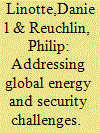

|
|
|
| 5 |
ID:
127530
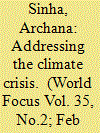

|
|
|
| 6 |
ID:
048160


|
|
|
|
|
| Publication |
DelhI, Wordsmiths, 2000.
|
| Standard Number |
8187412011
|
|
|
|
|
|
|
|
|
|
|
|
Copies: C:4/I:0,R:0,Q:0
Circulation
| Accession# | Call# | Current Location | Status | Policy | Location |
| 042481 | 320.9581/SRE 042481 | Main | On Shelf | General | |
| 042482 | 320.9581/SRE 042482 | Main | On Shelf | General | |
| 042483 | 320.9581/SRE 042483 | Main | On Shelf | General | |
| 042484 | 320.9581/SRE 042484 | Main | On Shelf | General | |
|
|
|
|
| 7 |
ID:
066749
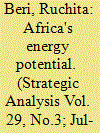

|
|
|
| 8 |
ID:
096180
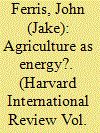

|
|
|
| 9 |
ID:
054050
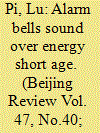

|
|
|
| 10 |
ID:
090061
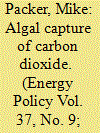

|
|
|
|
|
| Publication |
2009.
|
| Summary/Abstract |
The use of algae to capture carbon dioxide as a method for greenhouse gas mitigation is discussed. A small fraction of the sunlight energy that bathes Earth is captured by photosynthesis and drives most living systems. Life on Earth is carbon-based and the energy is used to fix atmospheric carbon dioxide into biological material (biomass), indeed fossil fuels that we consume today are a legacy of mostly algal photosynthesis. Algae can be thought of as marine and freshwater plants that have higher photosynthetic efficiencies than terrestrial plants and are more efficient capturing carbon (Box 1). They have other favourable characteristics for this purpose. In the context of New Zealand energy strategy and policy I discuss progress in growing algae and seaweeds with emphasis on their application for exhaust flue carbon recycling for possible generation of useful biomass. I also introduce schemes utilising wild oceanic algae for carbon dioxide sequestration and the merits and possible adverse effects of using this approach. This paper is designed as an approachable review of the science and technology for policy makers and a summary of the New Zealand policy environment for those wishing to deploy biological carbon sequestration.
|
|
|
|
|
|
|
|
|
|
|
|
|
|
|
|
| 11 |
ID:
141365


|
|
|
|
|
| Summary/Abstract |
India and Bangladesh have made significant progress on several matters, all of which certainly merit applause. However, more interesting is the progress made on sub-regional cooperation in the region. The bilateral connectivity will, no doubt, expand in the region, with other states like Nepal and Bhutan benefitting from the access to two Bangladeshi ports as well as trade through the Indian corridor. Matters of water sharing, trade and commerce, including energy, will soon go much beyond the bilateral prism. The recent motor vehicle agreement signed between Bangladesh, Bhutan, India and Nepal is just a first but critical step towards a sub regional initiative that has gathered momentum amongst the South Asian neighbours. Certainly bilateral matters will continue to dominate and be seen as more critical between any two neighbours. The sub-regional cooperation process will ensure that incentives to find resolutions to certain outstanding bilateral matters will assume greater salience.
|
|
|
|
|
|
|
|
|
|
|
|
|
|
|
|
| 12 |
ID:
078454


|
|
|
| 13 |
ID:
113141


|
|
|
| 14 |
ID:
121029
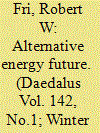

|
|
|
| 15 |
ID:
118931
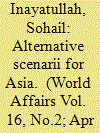

|
|
|
| 16 |
ID:
113145


|
|
|
|
|
| Publication |
2012.
|
| Summary/Abstract |
Public opinion about energy can be understood in a unified framework. First, people evaluate key attributes of energy sources, particularly a fuel's cost and environmental harms. Americans, for example, view coal as relatively inexpensive but harmful, natural gas as less harmful but more expensive, and wind as inexpensive and not harmful. Second, people place different weights on the economic and environmental attributes associated with energy production, which helps explain why some fuels are more popular than others. Americans' attitudes toward energy are driven more by beliefs about environmental harms than by perceived economic costs. In addition, attitudes about energy sources are largely unrelated to views about global warming. These findings suggest that a politically palatable way to reduce greenhouse gas emissions is through regulation of traditional pollutants associated with fossil fuels, rather than a wholly new carbon policy.
|
|
|
|
|
|
|
|
|
|
|
|
|
|
|
|
| 17 |
ID:
068843
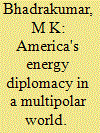

|
|
|
| 18 |
ID:
022780
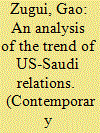

|
|
|
|
|
| Publication |
Oct 2002.
|
| Description |
18-36
|
|
|
|
|
|
|
|
|
|
|
|
|
|
|
|
| 19 |
ID:
092521
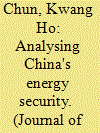

|
|
|
| 20 |
ID:
090075
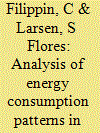

|
|
|
|
|
| Publication |
2009.
|
| Summary/Abstract |
This paper analyzes the energy consumption during the period 2001-2006 of 192 flats distributed in three-storey buildings, in order to understand how current policies related to energy use could be improved for increased residential energy efficiency in Argentina. The buildings (1, 2 and 3 bedrooms) are located in La Pampa, central Argentina, in a moderate cold climate. The dimensional and energy-consumption variables are studied (area, envelope's area, FAEP=envelope's area/floor area; envelope's thermal resistance R, volumetric heat loss G and auxiliary heating Qaux). The natural gas consumption is analyzed at annual and seasonal levels. Consumption variability among buildings, storeys and flats is calculated. The quantitative analysis is coupled to a qualitative description through direct observation of the buildings. The results show: (a) a high incidence of natural gas consumption in the total annual energy consumption (natural gas+electricity), (b) seasonality of natural gas consumption, with a maximum value in the cold period July-August (variability=80%), (c) little variability among buildings of the annual natural gas consumption (4.17%), (d) the lowest average energy consumption at the first floor, (e) high variability among flats on each storey, (f) winter consumption of a multi-family dwelling lower than a single-family dwelling of similar area and (g) little seasonal variability of the electricity consumption.
|
|
|
|
|
|
|
|
|
|
|
|
|
|
|
|